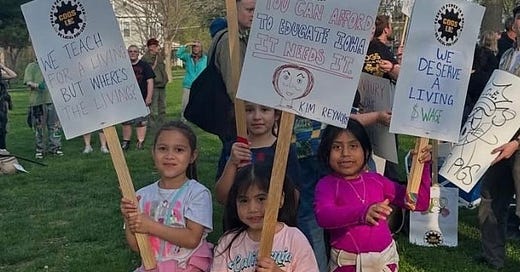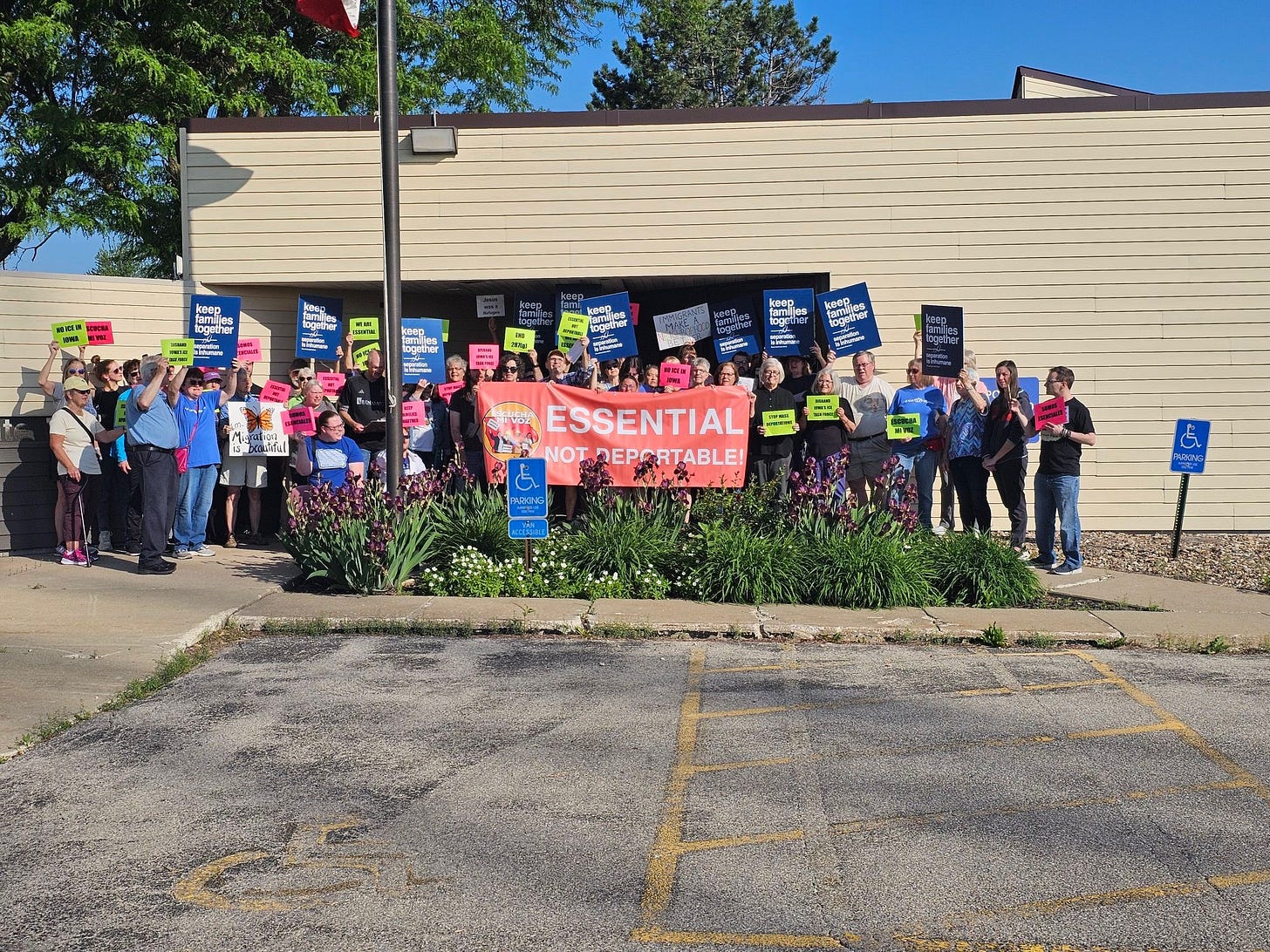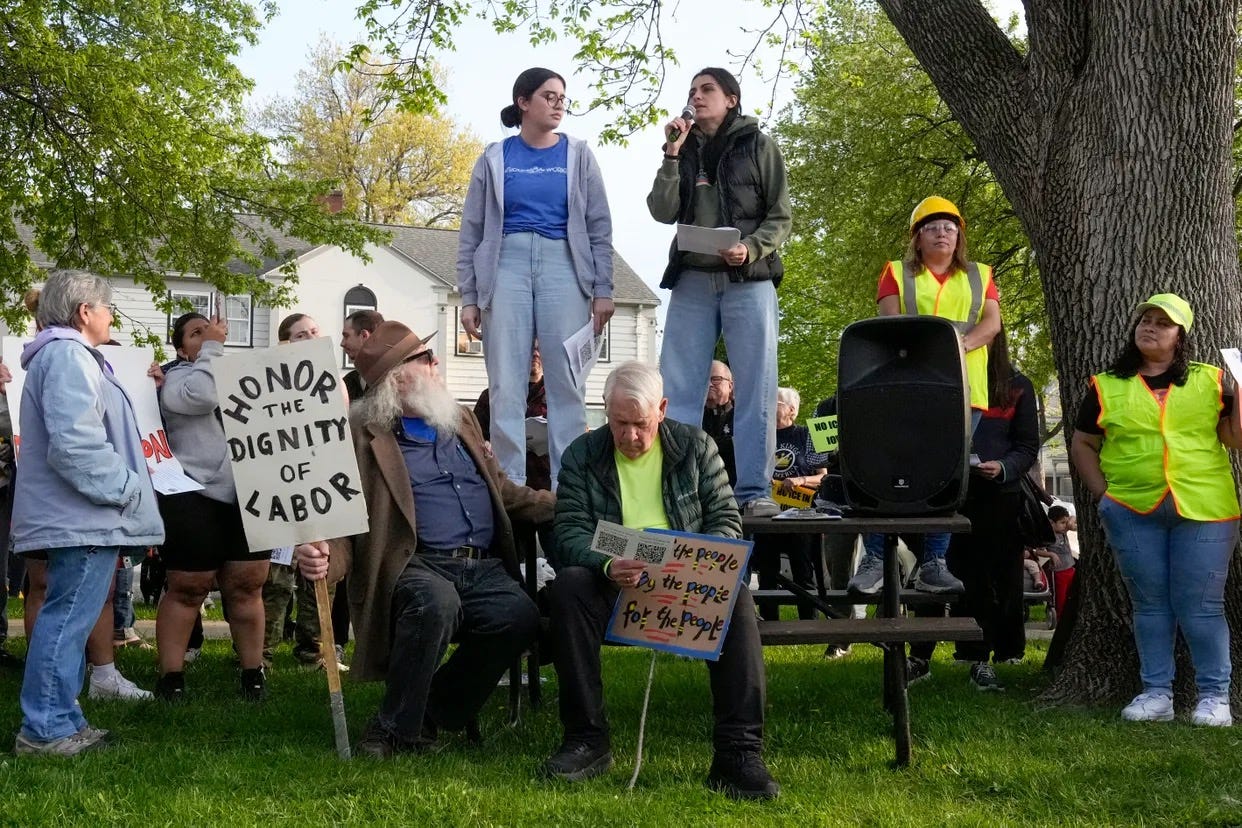"I only have you" : Escucha Mi Voz Accompanies New Arrivals
Scarlett Rose Ford reports on a migrant support ministry in Iowa City, Iowa that sprang out of the Iowa City Catholic Worker.
“Could you be in charge of my kid in case I get arrested?” a young mom from Ecuador asked Alejandra Escobar. She had only met with Escobar several times but trusted her with her child in case of deportation, saying, “I only have you.”
Escobar, 39, is an organizer for Escucha Mi Voz, a community organizing group focused on support for migrants. The group, which translates to “Hear My Voice” in English, provides resources for migrants in the Iowa City area, from clothes and shelter to legal assistance and temporary care for children.
“You’re alone when you’re here,” said Escobar, who herself is a migrant from Colombia. After completing her master’s degree at the University of Michigan in Ann Arbor in 2014, she moved to Iowa City. Loneliness is a problem many migrants in the U.S. are currently facing, and one that Escucha Mi Voz is working to eradicate.
The organization was born from the Iowa City Catholic Worker, whose house was founded out of a local parish rectory after Pope Francis’s 2015 speech to the U.S. Congress, which honored Dorothy Day as one of the great Americans that people should emulate.
In a 1953 article for the Catholic Worker, Dorothy Day wrote about migrant exploitation on California farms: “The situation of the migrant is worse than ever before…the same system that hires them, also robs them.” In Iowa City, where migrant agricultural workers make up a large portion of the economy, this holds especially true.
While the Iowa City Catholic Worker houses focus on providing immediate care and charity to those in need, Escucha Mi Voz focuses on creating lasting change within the community. Both work together to care for migrant families and take action for immigration reform in the heart of Iowa City.
“We want to build deep relationships in the community, get people engaged, and work to create long-term change, so a lot of our work goes hand in hand,” said Clare Lousseart, a volunteer at Iowa City Catholic Worker. “Escucha Mi Voz grew out of this need that we saw: We’re doing all this service, but how do we make it create long-term change and long-term good?”
Lousseart began volunteering with the Catholic Worker in high school; what began as required service hours quickly became a passion. “I saw the real effects of what happens when people get deported, what it means to be an asylum seeker, and the real danger that people might be fleeing,” she said.
Lousseart, now a sophomore at the University of Iowa, is studying elementary education and Spanish. Her choice to pursue a bilingual education degree was inspired in part by volunteering with the Iowa City Catholic Worker.
“When I was in high school, we were sponsoring a husband and wife. When they crossed the border, the wife was pregnant, and they had their son here. The dad was deported and experienced awful torture; it was heartbreaking and really eye-opening to me,” Lousseart said.
“In this instance, I thought that if we could just reunite this one family and save this one life, that’s worth it.”
The Iowa City Catholic Worker developed Escucha Mi Voz specifically to fight for social justice and immigration reform within the Iowa City community. The organization advocates for the workers’ rights, and provides meals, shelter, transport, legal aid, and loans without interest for all in need. Escucha Mi Voz offers to help with hospital bills and school registration — “everything that makes their life a little bit easier while they get used to he new country,” Escobar said.
With increased Immigration and Customs Enforcement (ICE) activity on city streets, Escucha Mi Voz has been hosting many know-your-rights trainings to help migrants be prepared for an encounter with ICE. The organization sends those in detention money, toiletries, food, and any additional support they may need.
Community members will often accompany migrants with notices to appear at ICE check-ins to their appointments. In March, 100 community members gathered outside the Department of Homeland Security’s offices in Cedar Rapids in a vigil while a Guatemalan woman met with ICE agents inside.
And, this week, Escucha Mi Voz chartered a bus for 50 people to accompany a woman to her fifth ICE check-in of the year, the Iowa City Press Citizen reported, which ICE canceled.
“We noticed that if they went by themselves, they might be deported. When people accompanied them, deportation was less likely,” Lousseart explained.
Escucha Mi Voz provides free legal help for migrants to assign a relative, friend, or community member with temporary delegation of custody of their children in the case of deportation. Many organizers, such as Escobar, have taken on this role, offering to accompany children back to their parents in their native countries if necessary.
The Iowa City Catholic Worker and Escucha Mi Voz came together over the past six months to plan the Aquí Estamos (We Are Here) March, which took place on May 1, International Workers Day, to stop mass deportations and keep families united.
Over 600 people attended to “stand up, pray, and fight back” for immigrant rights and justice reform. Escucha Mi Voz is also calling for the end of the state’s voluntary ICE Task Force, which allows local law enforcement to act as ICE officers.
At the heart of their justice work is the solidarity of community-building.
“While you’re working to create long-term change, you’re building relationships and strengthening your community in the process,” Lousseart said.
Recently, the Iowa City Catholic Worker and Escucha Mi Voz have partnered with several local parishes for a sacred listening campaign. A team of trained listeners has one-on-one conversations with the people of the parishes, both in English and Spanish, with the hopes of strengthening the relationships in the community and learning how to better attend to their needs.
“As a Church, we are called to stand in solidarity with the most vulnerable, especially immigrants, workers, and the poor,” the Iowa City Catholic Worker community said in a statement announcing the campaign. “By engaging in these sacred conversations, we aim to build a broader base of support for the Church’s call to action on issues of social justice and human dignity.
For Escobar, this relational aspect is especially important. “There’s always a relationship growing with each person because each story is so unique; I identify with them because I am an immigrant as well,” she said. “We share the same culture, the same language, the same food. Somehow, I feel at home.”
Many of the Escucha Mi Voz social justice events, while focused on serious discussions of legal rights, end in a night of eating, dancing, and community. For those unable to attend in person, Escucha Mi Voz also has a WhatsApp group to foster community and share resources online.
Their holistic, personalist approach to meeting the immediate physical needs of the community and the emotional needs of each person echoes not only the aims and means of the Catholic Worker but also the call of Jesus in the Gospel, where welcoming the stranger is not just an abstract ideal but a daily reality built on trust, compassion, and our shared humanity.
Scarlett Rose Ford is a recent graduate of the Master of Theological Studies program at Harvard Divinity School with a concentration in the History of Christianity.










God bless these immigrants who work so hard.